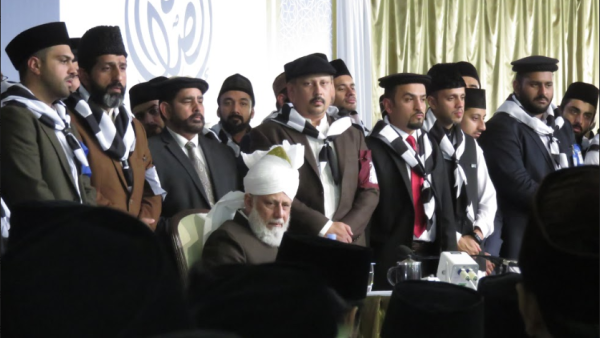By Eleanor Beevor
The UK media is unforgiving in its portrayal of British Muslims. Stories about extremism, delinquency or shocking culture clashes do a lot better than stories of Muslim charity work, or their efforts to overcome tensions with their neighbours.
But among the few “good news” stories given to Muslims in British media, the Ahmadiyya Muslim community is the subject of a huge majority of them. Ahmadi Muslims now occupy a fascinating space in Britain’s complicated, and often fraught relationship with Islam.
Ahmadis face danger for their minority beliefs within Islam, and fear and loathing from the far-right because of being Muslim. But they have also garnered praise from politicians for their efforts to cut across social barriers in Britain. Their leadership has championed the compatibility of British and Muslim identities, and their spiritual leader has even claimed that Ahmadis are “immune” to radicalisation.
And, if one can make sweeping judgements about “communities” from the relatively small numbers of confirmed cases of radicalisation, it seems that Ahmadi Muslims have indeed emerged largely unscathed. There are no known cases of Ahmadi Muslims in the UK supporting terrorism.
But what is behind this success story of multiculturalism? Is it, as many British politicians might assume, that Ahmadi theology is just more “moderate”? Or is it something else? And are there any lessons here for the muddled fight against extremism, in the UK and elsewhere?
This weekend, I attended one of the largest annual gatherings of Ahmadi Muslims in Britain. This is an admittedly very short time with which to try and answer these difficult questions. But so far I would argue yes. There is a lesson Britain can learn about preventing extremism from Ahmadi Muslims, but it’s not what you think.
My unexpected invitation to the Ahmadiyya Muslim Youth Association’s annual meeting came courtesy of Twitter. Last week, I got a message from Sabahuddin Ahmedi, or Sabah for short, who wanted to talk to journalists about Islam in the media.
An energetic, smartly dressed 24-year old who - as he says himself - doesn’t look much like most people’s image of an imam, Sabah works in the Ahmadiyya community press office. His work, he tells me over coffee in London, is to help change British people's’ perceptions of Islam, and to try and counteract the overwhelmingly negative image of Muslims in the media. There are all sorts of ways that Ahmadis work to do that. And if I want to see some of them myself, he says, I should come to Surrey and see what happens when 5,000 young Ahmadi Muslims get together.
Organising a gathering of several thousand isn’t easy at the best of times. But Ahmadis have more to worry about than most. The Ahmadiyya sect faces widespread prejudice across the world, including and especially from other Muslim communities.
Ahmadi Islam was founded in 19th Century India by Hazrat Mirza Ghulam Ahmad. Ahmad believed himself to be a prophet, destined to revive true Islam by establishing a community of followers. His followers, both then and now, believe that Ghulam was the Messiah of the Abrahamic religions, and his life was the Second Coming of Jesus. After Ghulam Ahmad’s death, Ahmadi Muslims maintained the tradition of centralised spiritual leadership by electing a “Caliph”. The present Caliph, Hazrat Mirza Masroor Ahmad, is the fifth leader of the Ahmadi community, and he resides in the UK.
Beyond these differences of belief, there is little to distinguish Ahmadi Islamic practice from more mainstream Muslim traditions. But Ahmadi Islam is still seen by many Muslim groups as misguided at best, and apostasy at worst.
There is widespread denial that Ahmadis are Muslim at all. Saudi Arabia forbids them from partaking in the Hajj pilgrimage. Just a few weeks ago, Pakistan’s new Prime Minister Imran Khan succumbed to pressure from Islamist groups in the country and sacked a high ranking Ahmadi economic advisor, explicitly because of the advisor’s religion. And this persecution can get violent, including in the UK. Two years ago in Glasgow, an Ahmadi shopkeeper called Asad Shah was stabbed to death in his shop by a Sunni Muslim taxi driver in a religious hate crime.
That they can’t take too many chances becomes clear as soon as I arrive at the youth summit. The setup is a number of large marquees over a field, and going through the first tent we pass through metal detectors. There’s always been a need for caution, but apparently it’s getting worse. Hazik, a friend of Sabah’s, later tells me: “We used to just have problems from the Islamist extremists. Now we have to worry about the far right too.”
Soon we’re through, and we start walking around the huge, muddy field surrounded by vast tents. There’s sports tents, an exhibition area, a “hub” where talks and discussions are going on, a vast prayer tent, and an even bigger marquee where at least some of the 5,000 are sleeping on mattresses. The program for the day is pretty loose, which leaves us the flexibility to wander and talk as we like.
People invested in discussions of Islam in Britain have a tendency to see what they want to see. Pro-multicultural liberals hope to see their own values reflected in British Muslims, while the cultural right-wing want evidence that Islamic and modern British cultures don’t mix. From this event, it’s quickly clear Ahmadi Muslims don’t fit neatly into the narratives of any side of the political aisle.
The press release of the Youth Association event heavily emphasized the patriotism, and the rejection of extremism of the Ahmadi community – one of the weekend’s events involved hoisting the British flag alongside the Ahmadi one. But that hasn’t meant the abandonment of conservative religious values.
For one thing, the 5,000 people attending this weekend actually only represent one half of the Ahmadi Youth gathering – the male half. The women’s event, I’m told, is next week. Everyone is keen to emphasise that this is what the women also wanted. They tell me that Ahmadi women had a decisive voice in keeping the events segregated, so that they could manage their event how they liked.
Nor, as I learn later, does the Ahmadi community do “dating” in the way that many young Britons do. Rather, there is an Ahmadi “marriage counsellors” service. The counsellors team makes profiles of young Ahmadi men and women of marriageable age who are looking for partners. The counsellors tell me they try and tailor their matches as much as possible to the individuals seeking partners. They ask them what kind of person they would like to be with, and their priorities in a potential partner. They also collect details of that person’s profession, their economic situation and so on. However, the work of making the initial match is left to the counsellors.
Being an Ahmadi, then, means surrendering a degree of individual freedom of choice. But whether this is a good or a bad thing depends very much on who you ask. Many western thinkers think (or at least think that they think) that individual rights should always be protected above the rights of a collective or a community. These things are never absolute for anyone – there is always social influence on the individual, and vice versa. But for the Ahmadi men that I spoke to, there is a sense of relief, and even of freedom, that comes from letting their faith and their community guide their major decisions in life.
This comes out very clearly when they discussed their relationship with the Caliph. Sitting on a huddle of sofas in one of the tents, a group of four young men told me about what the Caliph’s presence meant to them. Farhad, another young imam, tells me: “He’s a spiritual leader, but he’s like a father figure to all of us. Every day, he checks over seven hundred letters, because people write to him and ask for advice. And he always writes back.” Should someone want to seek his advice in person, I’m told, they can easily book an appointment with him. And people aren’t just looking for answers to spiritual questions.
Ahmadi Muslims want the Caliph’s guidance on their personal decisions. While his word is not a command per se, it is treated with the utmost seriousness. Sabah tells me that he began to look for a wife after the Caliph told him that this was the right time for him to get married. Now he and his wife are expecting a baby girl, and they have an appointment with the Caliph the following week, in which he will choose their daughter’s name. This is apparently common – all the men in our gathering concur that their names were chosen by either the current Caliph or the previous one.
People go to the Caliph for career advice too. Rizwan, an archaeologist, happily recounts getting the Caliph’s support to pursue his dream of studying the past. “The Caliph told me that Islam commands us to try and understand previous civilizations. He gave me the opportunity to go and do fieldwork. I now have annual meetings with the Caliph to ask for his advice. It gives me a huge sense of relief to have his guidance on my career.”
Munad, a lawyer, tells me that he went to the Caliph with a vague idea of studying law. The Caliph told him that he should become a barrister. Munad laughingly recalled: “When he told me to go and do the bar exam, I had no idea how much work that was going to be, or how competitive the bar is. I had to work very hard for it, but I got the marks I needed, and I’m glad I did it. It’s not like the Caliph is imposing his will on us. It’s more like he can see something in us, and he wants us to live up to our potential.”
There’s no disputing that the Caliph has a lot of power over his followers, of which there are many – there are 30,000 Ahmadi Muslims in the UK alone. That kind of charismatic authority doesn’t sit easily with some observers, who fear the consequences of a leader’s messaging changing. History has a few cautionary tales of leaders whose benevolent messages changed for the worse once they had built up a following.

However, there’s no denying that – as far as the Ahmadi community is concerned – this kind of centralized authority has pushed its members to connect with the outside world, not to cut themselves off from it. And it has had a strong hand in producing a very socially engaged, and very charitable community.
While I’m still sitting on the sofas talking about the Caliph, two young boys of around eight run up to hug their fathers. A few minutes later, the boys begin telling me about the charity sponsored walks they have been doing recently. Cue a host of stories from everyone in our growing group – now about ten people – of the charity efforts they are involved in. The Ahmadi Muslim Youth Association has an umbrella organisation called Mercy4Mankind, which raises money for a host of British charities. The charities they support range from large international ones, children’s and environmental organisations, health charities, and some perhaps surprising ones too, such as the Royal British Legion – a charity which supports the families of British military veterans.
I ask whether supporting a British military charity isn’t contentious in the eyes of some Muslims, given the UK’s controversial foreign policy history in the Middle East. Nazim, one of Mercy4Mankind’s coordinators who has sold poppies for the Royal British Legion before, replies that Ahmadi charity efforts are explicitly non-sectarian, and that they only look for where there is need.
By this time, we have been joined by Dr. Aziz Hafiz, the Emergency Relief Director of another international Ahmadi charity called Humanity First. He says that his organization has worked all over the world, and that its operations in Israel and Palestine have helped both Jews and Muslims. As well as working in Gaza and the West Bank, he said, they also work in Israel and helped to put out fires in synagogues during the Haifa fires of 2016.
My happenstance group of interviewees on the sofa continues to talk about their charity work, and it was clear that these are not just periodic charity efforts, but part of Ahmadis’ everyday existence. Whilst all major religions emphasise doing good as part of the faith, I’m struck by how much time every person speaking seems to spend on charity fundraising or volunteering. Everyone has a story of balancing fundraising with their day job, of voluntary work taking up their weekends. Everyone has some sort of involvement in an ongoing charity project.
I ask why they think this kind of charity work is so central to their lives. Pushing the envelope further, I ask whether there’s something exceptional about Ahmadi theology that lends itself to this altruistic spirit, perhaps better than other theologies. There’s a pause, and Farhad the imam thoughtfully responds. “I think that all Muslim groups take part in charity work. Islam teaches us that we must work to benefit our fellow humans. But our community has a very strong organizational structure, so it’s much easier for us to work together.”

His answer surprised me a little. Like all religious groups, Ahmadis have particular beliefs that they want to spread, and I had expected them to take the opportunity to emphasise their own theological virtues. But in Farhad’s eyes, it wasn’t that their Islam was any more or less charitable than other variants. Rather, they had the community structure to work effectively on a large scale.
And it’s hard to argue with their level of organization. Ahmadi youth don’t just have loose gatherings based around certain mosques. They have 126 “Local Chapters” across the country, and 18 “Regional Chapters”. Each chapter has weekly and monthly meetings, and organisers who are charged with getting the community involved in religious and social life, especially in charity work. Chapters work together, and can scale up for big charity projects, or draw in volunteers from across the country.
There’s a saying that charity is its own reward, but when British Muslims have to fight for acceptance in their own country, it’s also a practical way to reach across social divides. Hazik tells me that when Ahmadi Muslims gathered in Cumbria, northern England, in 2015 to help with relief efforts after flooding, the community there were initially very hesitant about accepting help from Muslims.
“For the first couple of days it was really awkward. We were knocking on doors and asking if people needed any help, but most of them refused. It was only after two or three days that they started letting us into their homes to help clear up. The community there is very right-wing, but the local priest, who let us use his church as a base for the relief efforts, told me that we had helped change their view of Muslims.”
Talk of breaking divides brings us to one of British politicians’ favorite buzzwords – “integration”. It’s a lot harder these days to convince Britons that multicultural societies are a positive thing. Media outlets have thrived on stories of Islamists in the UK pushing ultra-conservative practices, or of firebrand preachers praising jihadists from British mosques. And it’s increasingly hard to voice concerns about extremism, or about women’s and LGBTQ rights in variants of British Islam, without having the discussions overtaken by racists.
Amidst it all, politicians find refuge by telling British Muslims that they must “integrate”. But rarely is “integration” defined, and even more rarely is it defined comprehensibly. When Theresa May was Home Secretary, she attempted to define extremism as a rejection of “British values”. However, Britons were left none the wiser about what exactly “British values” were, or how they might be used as a yardstick for whether someone was “extremist” or “integrated”.
Farhad had a compelling response. “To me, integration should mean being a productive member of society. Obviously as Muslims we can’t be involved in some aspects of British culture that, for example, promote drinking alcohol or going to clubs. But I think that we can still be very productive citizens. A tenet of Islam is that loyalty to your faith requires loyalty to your country. I think that we are showing that we are integrated when we give back to the society we live in.”
Eventually, our discussion group broke up. Sabah and I left the tent and began walking around the field to tour the other tents. Our walk was perpetually being paused, however, by an endless stream of people stopping to greet Sabah. Rarely did more than thirty seconds go by without him having to stop and say hello to a friend, or a distant relative.
On the way we were joined by the young son of one of his friends - a boy of about nine, who bounced along with us long enough to tell us about all the milkshakes he’d managed to drink that day, before scampering off to join a crowd of friends he saw in the distance.
It struck me that even though this event was the size of a small music festival, fathers didn’t seem remotely worried about losing their children. They didn’t need to be. It’s hard for kids to get lost when everyone knows everyone, and within a matter of seconds they would be able to find a family friend or relative.
The climax of the Sunday was a prayer session, an address and a prize giving ceremony led by the Caliph himself. The five thousand attendees gathered in the huge prayer marquee, clustering around a massive camera crane that was going to broadcast the address live on an Ahmadi TV channel. Silence fell when the Caliph, accompanied by his security detail, walked onto the stage.
Once prayers finished, I saw a table with a vast array of gold and silver prize cups. It turned out these were for recognizing the achievements of young people in each local chapter. What looked a lot like a typical school prize giving followed. About a hundred prizes for academic achievements, sporting wins and charity work in local chapters were given out, with each recipient clearly excited and more than a little star-struck at being awarded a cup by the Caliph.
Anthropological studies suggest that the awe, and the extraordinary qualities that communities see in their spiritual leaders are built up over time. As people grow older, they become more enthralled by their spiritual guide’s special qualities, not less.
Certainly Sabah told me that even though he has met the Caliph plenty of times, he is still lost for words every time they meet. And when the Caliph’s speech started, he undoubtedly had the enormous tent’s rapt attention.
The flipside of mysticism developing over time means that it’s less easy for outsiders to share in the wonder. Nevertheless, I could immediately see why Ahmadis look on him as a father figure. The Caliph’s speech was about the spiritual importance of prayer. Yet it often had the tone of a kind, but mildly exasperated father lecturing his children about their behavior.
He gently chided the audience that however busy their work schedules were, there was really no excuse for skipping their afternoon prayers, and that if they had a habit of missing morning prayers to sleep then they should start going to bed earlier. The speech wrapped up the summit, and now there was a crush of people trying to leave the field before traffic jammed the exits, but also having to say goodbye to the myriad friends and family they had spent the weekend catching up with.
It isn’t all easy within the Ahmadiyya community. Earlier that day I had met a mental health campaigner (again, working in a mental health charity at weekends) who was trying to persuade young Ahmadis to open up about their problems. He told me that the British Asian community is heavily affected by mental health problems, and that’s partly exacerbated by struggles over their cultural identity.
Still, Ahmadi Muslims seem to have a powerful defence against many of the drivers of unhappiness in modern British society – drivers which, in turn, have been shown to lead to some individuals adopting extremist views.
These are things such as a felt lack of purpose, a feeling of isolation, uncertainty about how to balance different aspects of identity, or a longing to be a part of something bigger than oneself.
The Ahmadiyya community’s best defence, as far as I can see it, is the tight-knit community itself. Support, leadership, advice, and useful things to do are not just in easy reach. They are built into social life. That will come with trade-offs. With a close community comes strong expectations to uphold traditional community values and ways of life, which not all individuals will find easy.
Talking of “collectives” versus “individuals” is always misleading. In reality, there will always be a mix of the two, as people push back and forth to balance their own desires with the need to stay connected. But amongst Ahmadi Muslims in the UK, there’s plenty of connectivity between each other, and a sincere desire to connect with the rest of the country.
Governments can’t just replicate the Ahmadi model. It’s a product of all sorts of things - not least its unusual, highly centralized leadership. But they can learn something about where to start dealing with extremism.
Rather than repeating commands to integrate, they might try giving people meaningful things to integrate into.







